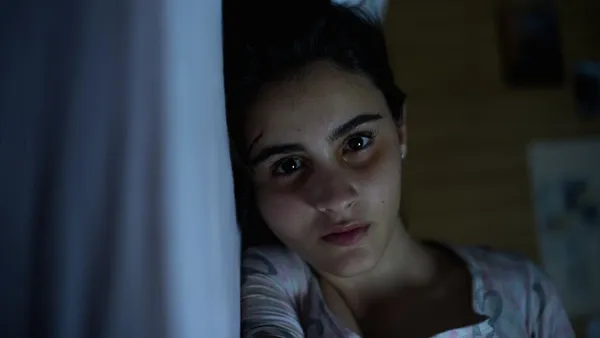Eye For Film >> Movies >> Kill Me Please (2015) Film Review
Kill Me Please
Reviewed by: Jennie Kermode

Barra da Tijuca, Rio de Janeiro, Brazil. A woman walks home alone at night. Someone is watching her; she feels it. She tenses. She walks faster. The people and buildings begin to thin out. She walks a little faster. She falls. She looks around, and screams.
Barra da Tijuca. A serial killer is stalking the neighbourhood. The victims are mostly female, mostly in their twenties. Police and church officials warn women to be careful about where they go and what they do, but life goes on. For Bia (Valentina Herszage) and her friends, that life revolves around high school, dating, unrequited crushes and who's saying what about who. But even before the girls make their discovery, Bia is beginning to find that her fantasies stray beyond the bounds of acceptable girl talk.

What the girls discover is a dying woman, battered and covered in blood. Bia looks after her whilst her friends run to get help, stroking her hair tenderly, repeating familiar "Don't go to sleep. Stay with me" lines. She also kisses her. Later she will claim that she was giving mouth-to-mouth. Crimson blood stains her lips, recalling scenes of sexual awakening in The Company Of Wolves, and Kill Me Please shares something of the fairy tale character of that film. Like a Brazilian Angela Carter, writer/director Anita Rocha da Silveira tells the story of a young woman emerging from a sheltered suburban world to walk a dark path, discovering the wild creature inside herself.
Is it about attention? Every teenager needs it. The killer is getting a lot of attention - everybody at school has theories about him and he's always being talked about online and on TV. Each victim, in her turn, is a celebrity. Bia goes home to a house where her brother is ignoring her, himself obsessed with the murders for reasons that take time to emerge. Her father is absent, her mother usually staying with a boyfriend. At 15, Bia is instinctively looking for ways to assert herself and claim her own identity. There's a boy, but he's just not as interested in sex as she is, perhaps in part because he glimpses what it means to her. To kill or be killed comes to seem like the only pure expression of selfhood.
Straining to pull Bia in another direction are the evangelists who alternately try to comfort the community and try to pray away the unknown predator. Their toothpaste commercial smiles and willingness to treat the murders as some kind of moral punishment is a source of uneasy comedy, carefully positioned to balance the high school drama and Bia's interior journey. It also speaks to the belief in something transcendent, even if the believers in this case are not very convincing. Towards the end, Bia's experience begins to take on a spiritual character; whilst the people of the suburb seem trapped, unable to take any kind of effective action to defend themselves, any difference, any reaching beyond, bears a kind of hope.
Weaving together these threads with a style that complements the different genres involved, da Silveira shows remarkable confidence for a first time feature director. Herszage, meanwhile, is remarkable in the lead, a deserved winner of the Best Actress award at the Rio de Janeiro International Film Festival. Taking a sidelong look at a species of horror most women will find familiar, albeit in a less acute way, Kill Me Please is a film that deserves to have people sit up and pay attention.
Reviewed on: 25 Aug 2017
















